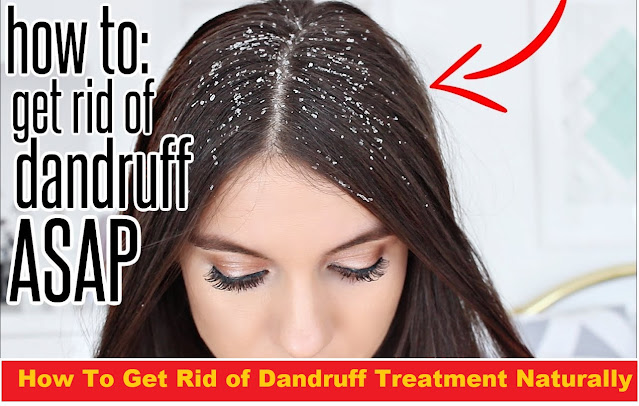How To Get Rid of Dandruff Treatment Naturally and Permanently
Dandruff can damage your personality, because dandruff is a big cause of Hair fall. When you meet peoples in Different parties and Public places and you have dandruff when definitely you feel uncomforting. because this looks like very ambushing in front of guests. Mostly Women's have that issue and due to this they use costly shampoos and Hair tonics.
Now, I am sharing some info about Dandruff causes and their solution by home made remedies and naturally.
Dandruff is a common condition that causes the skin of the scalp to peel off. It is not contagious or dangerous. But it can be embarrassing and hard to deal with.
Mild dandruff can be treated with a mild daily shampoo. If that doesn't work, medicated shampoo can help. Symptoms may return later.
Dandruff symptoms:
Dandruff signs and symptoms may include:
- The skin flakes off on the scalp, hair, eyebrows, beard, mustache and shoulders
- itchy scalp
- Scaly, scaly scalp in infants with cradle cap.
The Reasons
Dandruff may have several causes, including:
- Irritated oily skin
- dry skin
- A yeast-like fungus (Malassezia) that feeds on the oils on the scalps of most adults
- Allergy to hair care products (contact dermatitis)
- Other skin diseases, such as psoriasis and eczema
Risk factors
Almost anyone can get dandruff, but certain factors can make you more likely to get it:
age. Dandruff usually begins in adulthood and continues into middle age. This does not mean that older people do not get dandruff. For some people, the problem can last a lifetime.
to be male. Dandruff is more common in males than in females.
certain diseases. Parkinson's disease and other diseases that affect the nervous system appear to increase the risk of developing dandruff. The same applies to HIV infection or a weak immune system.
How To Get Rid of Dandruff Treatment Naturally :
Itching and flaking dandruff can always be controlled. For mild dandruff, first try regular cleansing with a gentle shampoo to reduce oil and skin cell buildup. If that doesn't help, try using a medicated shampoo to treat dandruff.
Some people can tolerate using medicated shampoo two to three times a week, shampooing regularly on other days if necessary. People with drier hair will benefit from using less frequent shampoo and conditioner for hair or scalp.
Hair and scalp products, both medical and non-medical, are available in the form of lotions, foams, gels, sprays, ointments, and oils. You may need to try more than one product to find the routine that works for you. And you'll likely need frequent or long-term treatment.
If you get itching or stinging from any product, stop using it. If you develop an allergic reaction - such as a rash, hives, or difficulty breathing - seek medical attention immediately.
Dandruff shampoos are classified according to the medications they contain. Some are available in stronger formulations by prescription.
Zinc pyrithione shampoo (Dermazinc, Head & Shoulders, and others). These contain the antibacterial and antifungal agent zinc pyrithione.
Tar shampoos (Neutrogena T/Gel, 18 Coal Tar Scalp Shampoo, and others). Coal tar slows down the speed at which skin cells on your scalp die and flake off. If your hair is light in colour, this type of shampoo may cause discoloration. It can make the scalp more sensitive to sunlight.
Shampoos containing salicylic acid (Jason's Dandruff Treatment Shampoo, Baker B&S, and others). These products help eliminate scaling.
Selenium sulfide shampoo (Head & Shoulders Intensive, Selsun Blue, and others). These contain an antifungal agent. Use these products as directed and rinse well after shampooing, as they may discolor the hair and scalp.
Ketoconazole shampoo (Nizoral anti-dandruff). This shampoo is intended to kill dandruff-causing fungi that live on your scalp.
Fluocinolone shampoo (Capex, Derma-Smoothe/FS, and others). These products contain a corticosteroid to help control itching, scaling, and irritation.
If a shampoo has been working for a while and then seems to lose its effectiveness, try switching between two dandruff shampoos.
Once your dandruff is under control, try using less medicated shampoos for maintenance and prevention.

Read and follow the directions on each bottle of shampoo you try. Some products should be left on for a few minutes, while others need to be rinsed off quickly.
If you have been using medicated shampoo regularly for several weeks and still have dandruff, talk to your doctor or dermatologist. You may need a strong prescription shampoo or steroid lotion.
Lifestyle and home remedies:
You can take steps to reduce or control your risk of developing dandruff:
Learn how to manage stress. Stress affects your overall health, leaving you vulnerable to a number of conditions and diseases. It can even help trigger dandruff or worsen existing symptoms.
Follow a healthy diet. A diet that provides enough zinc, B vitamins and certain types of fats may help prevent dandruff.
Develop a hair and scalp care routine that works for you. If your scalp is oily, daily shampooing may help prevent dandruff. Gently massage your scalp to break up dandruff. Rinse well. If your hair tends to be dry and your scalp is sensitive, use less shampoo and maintain your scalp between washes (Design Essentials, Melanin Hair Care, ScalpBliss).
Get some sun. Sunlight may be helpful in controlling dandruff. But since exposure to UV rays damages your skin and increases the risk of skin cancer, don't sunbathe. Instead, spend a little time outdoors. And be sure to apply sunscreen to your face and body.
Cut back on styling products. Styling products can build up on your hair and scalp, making it greasy.
Alternative medicine:
Tea tree oil is included in a number of shampoos, but there is no strong evidence to support its use to control dandruff. It comes from the leaves of the Australian tea tree (Melaleuca alternifolia) and has been used for centuries as an antiseptic, antibiotic, and antifungal agent. The oil may cause allergic reactions in some people.




No comments